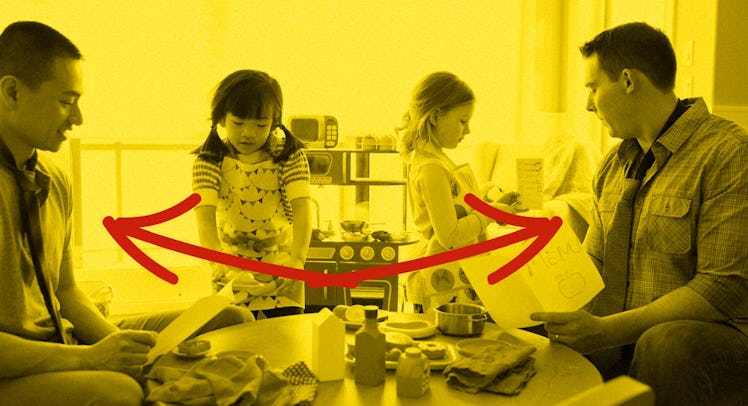How to Hang Out With Another Dad You Just Can’t Stand
If your child is friends with someone whose parent just flat-out sucks, here are a few ways to slog through your inevitable interactions.

For the most part, my son’s friends’ fathers are all good and decent humans, accomplished gentlemen who pay attention to their children, provide for their families, hand foul balls to kids, stay off Twitter and don’t look directly at solar eclipses. But there’s one exception, one single outlier whom I shall take pains to avoid identifying, except to say that his politics stand opposite to mine, his approach to coaching stands opposite to mine, his ability to feel personally insulted by town planning decisions is striking, and if he makes another comment about my vinyl collection I will punch him in the mouth with a Phil Collins record. (But Seriously does not contain a single bad song, fight me.)
I don’t deal with this outlier often — if he comes around, I just blast “Something Happened on the Way to Heaven” until he gets back in his stupidly enormous truck, which I imagine he needs to survive the treacherous half-mile trek back behind the Panera. But if you involve your children in activities, play dates or leaving the house, you have probably dealt with a dad you’d just as soon abandon on a rural roadside than talk to about scheduling, or forthcoming Little League matchups, or anything. If your child is friends with someone whose parent just flat-out sucks, here are a few ways to slog through your inevitable interactions.
Just talk about the kids.
Most parenting books will tell you that a key part of establishing adult friendships is to talk about something other than the kids — music, hobbies, that ABBA sequel movie, whatever. In this case, don’t do any of that. Literally, just talk about the kids. The kids provide a topic that’s a shared, navigable conversational safe space. Also, you probably don’t hate the kid, especially if he or she has forged a bond with yours. If the jag-dad wants to change the subject, simply shift it back, i.e.:
Him: “Finally, a president with the BALLS to tweet at those assholes in Iran in all-caps, amIright?”
You: “Wow, Jaxson’s really been working on his grounders, I’m gonna go get a Mountain Dew.”
Establish a code word with your partner, or an impartial third party.
Hopefully, you’ve already done this. Even the most desperately needy guy will interrupt showing you 50 kayak-based selfies if your partner shows up needing your attention. Well, usually.
Find some shared activity you can do instead of talking.
Sadly, we can’t offer much in the way of specifics here, because it depends on where you are and what you’re doing and who’s playing where and how much escape room you have. But rather than stand around and slog through a conversational swamp, seek out some task the two of you can complete together: clean up the playground, lay down the chalk on the baselines, move some chairs around, help an old lady across the street, whatever. If you have a task to complete, you can focus on something other than feeling stuck.
Take solace in the fact that this can’t go on for much longer.
Everyone, even right-wing lunatics, liberal Twitter jackasses, pathological frauds, inveterate liars, and people who disapprove of Phil Collins can tell when someone is trying to avoid them. They’ll try a few times and then stop. Remember when you kept trying to strike up conversations with the blond in your 11th-grade biology class and it just never happened and eventually you gave up and resigned yourself to just getting incredibly good at Ninja Gaiden II: The Dark Sword of Chaos? That sense doesn’t go away when you’re older. Slog through the first few interactions, and soon you’ll settle into a new standard where you nod and wave during pick-ups and drop-offs and ignore each other the rest of the time. Or, you know, you can be civil and have the same result, demonstrating to your kid that, while not all people can see eye to eye, they can be cordial.
This article was originally published on